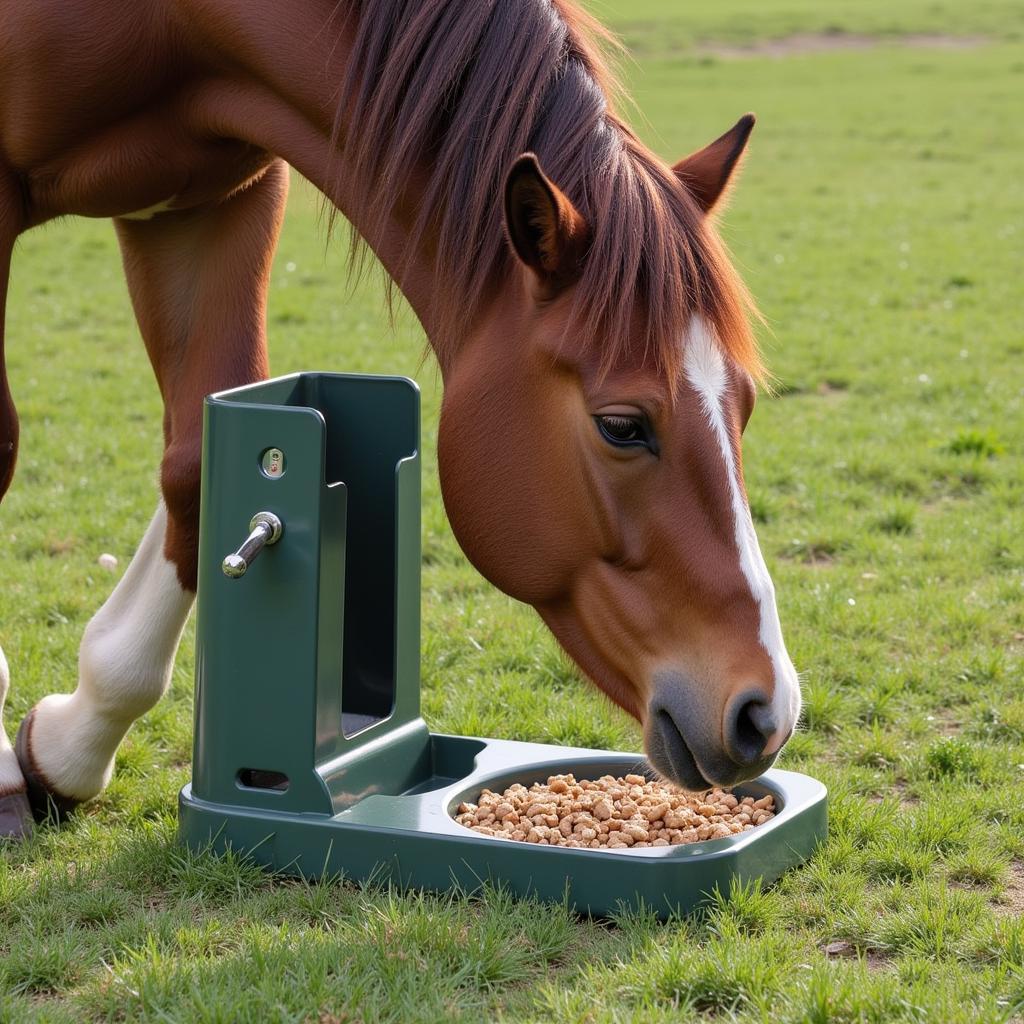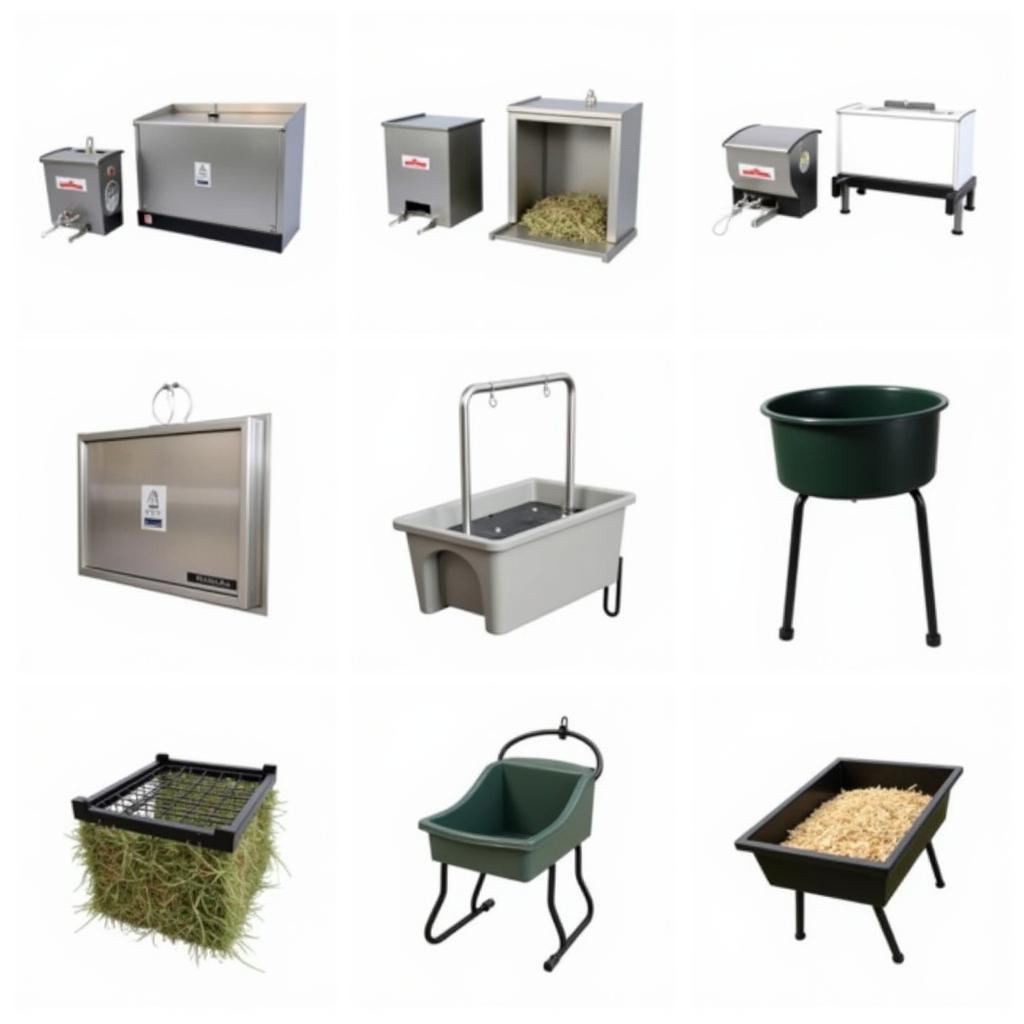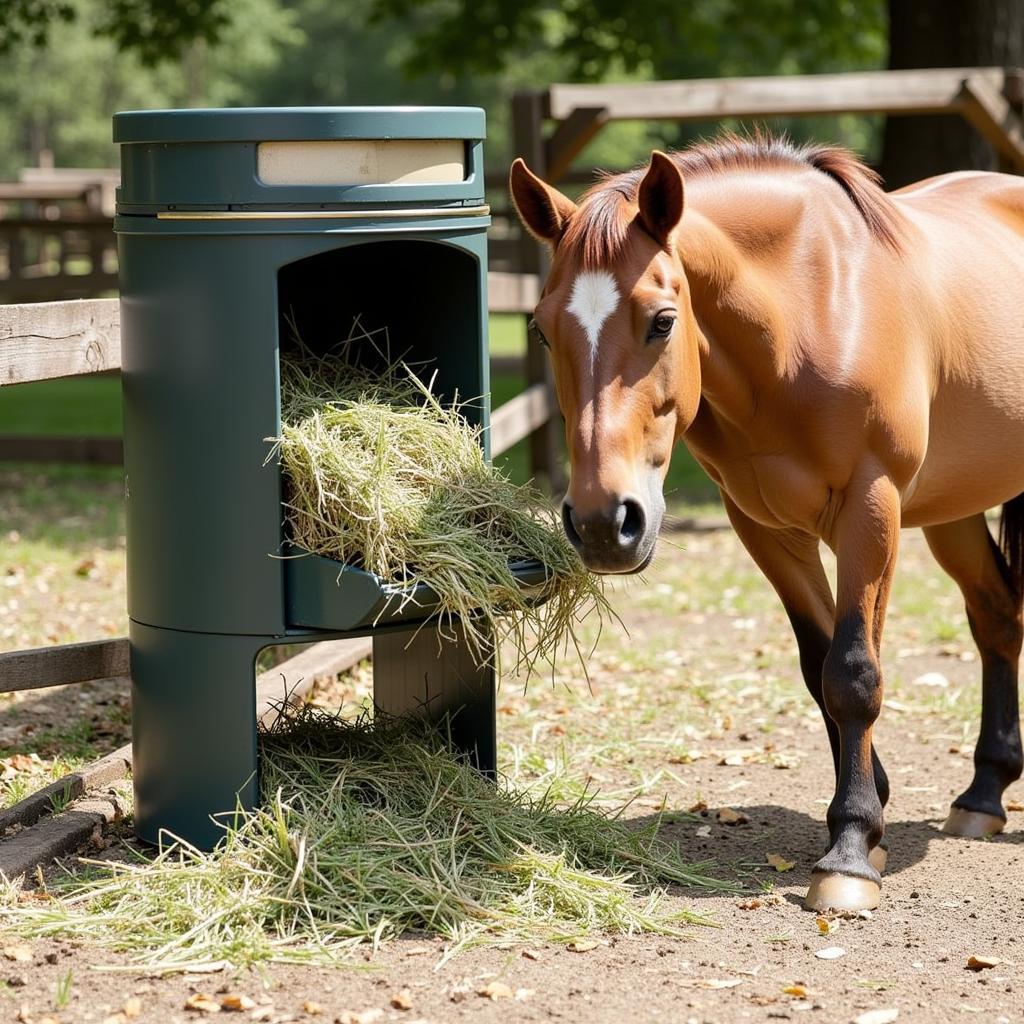Mini horses, with their adorable stature and charming personalities, have captured the hearts of horse lovers everywhere. But don’t let their cuteness fool you – these pint-sized equines need just as much care and attention as their full-sized counterparts, especially when it comes to their diet. A crucial aspect of mini horse ownership is selecting the right feeding equipment, and “[Mini Horse Feeder]” is a search term that leads many new owners down the right path. Choosing a feeder specifically designed for miniature horses can make a world of difference in their health, happiness, and overall well-being.
 Mini Horse Enjoying Feeder
Mini Horse Enjoying Feeder
Why Size Matters: Mini Horse Feeders vs. Regular Feeders
You might be tempted to simply use a smaller version of a regular horse feeder for your miniature companion, but this can lead to a whole host of problems. Here’s why:
-
Neck Strain: Mini horses have shorter necks than full-sized horses. Using a feeder that’s too high can cause them to strain their necks to reach their food, leading to discomfort and potential health issues.
-
Waste: A large feeder encourages a mini horse to play with their food, tossing it out onto the ground. This not only wastes food but can also attract pests.
-
Dominance Issues: When multiple mini horses share a large feeder, it can lead to competition and dominance struggles, with the more assertive horses potentially preventing others from accessing their food.
 Variety of Mini Horse Feeders
Variety of Mini Horse Feeders
Key Considerations When Choosing a Mini Horse Feeder
Selecting the ideal mini horse feeder involves carefully considering several factors to ensure it meets your horse’s specific needs and promotes their well-being:
1. Material Matters: Durability and Safety First
Mini horse feeders are typically made from a variety of materials, each with pros and cons:
-
Rubber: Rubber feeders are a popular choice as they’re durable, easy to clean, and less likely to cause injuries.
-
Plastic: Plastic feeders are lightweight and affordable but may not be as durable as rubber or metal options. Look for high-quality, UV-resistant plastic to prevent cracking and fading.
-
Metal: Stainless steel or galvanized metal feeders offer excellent durability but can be heavier and more expensive.
2. Location, Location, Location: Stall, Pasture, or Both?
Think about where your mini horse spends most of their time. Do they live primarily in a stall, have access to a pasture, or a combination of both?
-
Stall Feeders: Horse stall runs often benefit from wall-mounted or corner feeders to maximize space and reduce the risk of the feeder being tipped over.
-
Pasture Feeders: For horses turned out, consider a ground feeder that can be easily moved to fresh areas to prevent overgrazing.
3. Design Features: Promoting Healthy Eating Habits
Look for design elements that encourage natural grazing behaviors and prevent digestive issues:
-
Slow Feeders: For horses prone to overeating, a slow feeder for horses grain can help regulate their intake and prolong feeding time, reducing the risk of colic and other digestive problems.
-
Hay Feeders: A dedicated plastic horse hay feeder helps keep hay clean and off the ground, minimizing waste and reducing the risk of parasites.
-
Grazing Muzzles: While not technically feeders, best grazing muzzles for horses can be beneficial for overweight mini horses, allowing them to graze naturally while limiting their intake.
4. Capacity: Right-Sizing for Your Mini’s Needs
Consider how much your mini horse eats per feeding and choose a feeder with an appropriate capacity to avoid constant refilling while preventing food waste.
 Mini Horse with Hay Feeder
Mini Horse with Hay Feeder
Expert Insights: What the Pros Say About Mini Horse Feeders
“When choosing a mini horse feeder, safety should be your top priority,” advises equine veterinarian Dr. Sarah Jones. “Look for rounded edges and smooth surfaces to minimize the risk of injury.”
Experienced mini horse breeder, Lisa Carter, adds, “Don’t underestimate the importance of a feeder that’s easy to clean. Regular cleaning helps prevent mold and bacteria growth, keeping your mini horse healthy.”
Finding the Perfect Fit: Your Mini Horse Feeder Checklist
-
Height: The bottom of the feeder should be level with your mini horse’s chest to encourage natural head and neck posture.
-
Stability: Choose a feeder with a wide base or secure mounting options to prevent tipping, especially if your mini horse is known to be playful or pushy.
-
Ease of Cleaning: Opt for a feeder with smooth surfaces and removable parts for easy cleaning and disinfecting.
-
Durability: Select a material that can withstand the elements and regular use, especially if the feeder will be kept outdoors.
Conclusion: Happy Horse, Healthy Diet
Choosing the right mini horse feeder is an essential aspect of responsible mini horse ownership. By carefully considering factors such as size, material, design, and your mini’s individual needs, you can provide them with a comfortable and enjoyable eating experience that supports their overall health and well-being.
Remember, a well-fed mini horse is a happy and thriving companion!
FAQs about Mini Horse Feeders
Q: Can I use a goat feeder for my mini horse?
A: While goat feeders can share some similarities with mini horse feeders, it’s generally not recommended. Goat feeders are often designed for browsing and may not be suitable for the way mini horses eat.
Q: How often should I clean my mini horse feeder?
A: It’s best to clean your mini horse feeder at least once a week, or more often if it becomes soiled.
Q: My mini horse is a messy eater. What can I do?
A: Consider using a feeder with a lip or guard to help contain spills, or try a slow feeder to encourage your mini horse to eat more slowly and deliberately.
Q: Can I leave my mini horse feeder out in the pasture all the time?
A: It’s generally safe to leave a feeder out in the pasture, but it’s essential to monitor the area for overgrazing and move the feeder regularly.
Q: Where can I find high-quality mini horse feeders?
A: You can find a wide selection of mini horse feeders at reputable farm supply stores, online retailers, and equine specialty shops.
Have more questions about mini horse feeders or other aspects of mini horse care? Contact us! Phone Number: 0772127271, Email: [email protected] Or visit us: QGM2+WX2, Vị Trung, Vị Thuỷ, Hậu Giang, Việt Nam. We have a 24/7 customer support team.